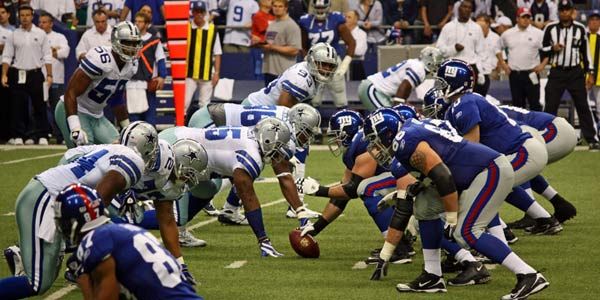Will an NFL Lockout Really Start a Crime Wave?

A few weeks back, Baltimore Ravens linebacker Ray Lewis spoke about the labor dispute that threatens to cancel the coming football season and made a prediction that hit almost as hard as one of his quarterback-leveling sacks: Without pro football, crime among fans will increase. "Do this research if we don't have a season," Lewis said. "Watch how much crime picks up, if you take away our game."
Well, we did a little research and while it seems that the crime-reducing effects of the National Football League are highly speculative, Lewis' theory is actually not as wacky as it sounds.
Since at least 1903, researchers have claimed that sports may benefit society. An article that year in the American Journal of Psychology, titled "The Ethics of Football," said the sport "cultivates temperance and self-control ... manly courage, skill in planning, obedience, co-operation, esprit de corps."
Some researchers still believe a version of this today. There is evidence that sports promote social interaction and that after a disappointing loss fans "join together to cheer up each other," said Sandy Wolfson, a psychologist at the University of Northumberland in Britain. So football might reduce crime simply by keeping people cheery.
Another theory is that we're just couch potatoes. This one comes from economics: it's possible to reduce crime simply by keeping people busy. That is what Lewis seemed to argue when he said that without the NFL on TV, "there's nothing else to do."
A forthcoming study on the Great Depression supports this idea. In it, the researchers found that giving unemployed people jobs reduced crime more effectively than giving them direct payments, most likely because it kept them busy, according to economist Price Fishback of the University of Arizona, a co-author of the study, to be published in the Journal of Law and Economics.
Similarly, violent movies might deter violent crime by keeping violent people (who are drawn to such films) occupied, according to a 2009 study by economists Gordon Dahl of UC San Diego and Stefano DellaVigna of UC Berkeley. They found that fewer violent crimes were committed in the U.S. on weekends when the theater audience for violent movies was relatively large. [Read: How Long Do Mafia Victims Take to Dissolve In Acid?]
Sign up for the Live Science daily newsletter now
Get the world’s most fascinating discoveries delivered straight to your inbox.
On the other hand …
While those studies support Lewis' claim, there's also reason to believe that a season without football might actually reduce crime rates. The popular theory that claims that sports provide a healthy outlet for aggression, also known as "catharsis," has been largely debunked, researchers say. "Acting aggressively or excitedly tends to lead to more aggression or excitement, not less. That is why you tend to get violence after a big sports victory in a city rather than a decrease in violence," Art Markman, a psychologist at the University of Texas, told Life's Little Mysteries.
What do the actual statistics say? There are so many other factors that some say research may never be able to isolate the effects of football. "It is nearly impossible to make a correlation between football games and crime," said Anthony Guglielmi, director of public affairs for the Baltimore Police Department. [Read: Where Do Murderous Tendencies Come From?]
Yet a few studies have tried, and have found that for some populations football can do the opposite of what Ray Lewis predicted.
A 2009 study of college football games, led by economist Daniel Rees of the University of Colorado Denver, found sharp increases in assaults and vandalism in neighboring communities on game days. And a 2011 study of six NFL teams found that when a home team suffered an upset loss, male-on-female domestic violence increased. For a narrow window near the end of the game, the increase was 10 percent in the losing team's home state, compared with Sundays when the home team won or was expected to lose anyway.
But are these fairly narrow studies evidence that canceling the NFL season might reduce crime? In the end, Markman suspects the overall effects of an NFL lockout would be small compared to all the other things that affect people's lives.
"That is probably the scariest message for the NFL," he said. "Most people will discover that they have plenty of other things to do if the football season is canceled." Hopefully, those activities don't include committing crimes.
This story was provided by Life's Little Mysteries, a sister site to LiveScience. Follow Life's Little Mysteries on Twitter @llmysteries, then join us on Facebook.












